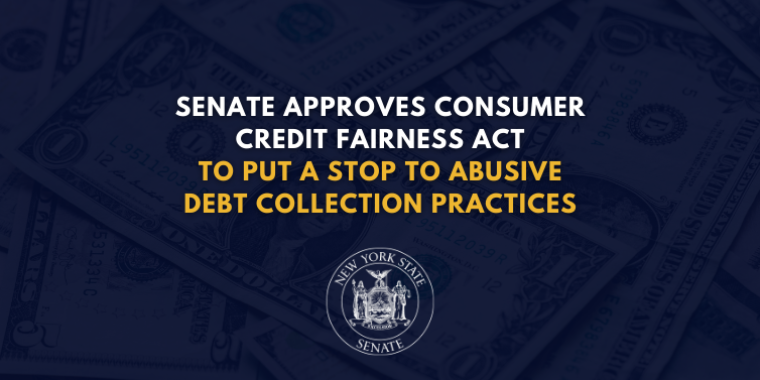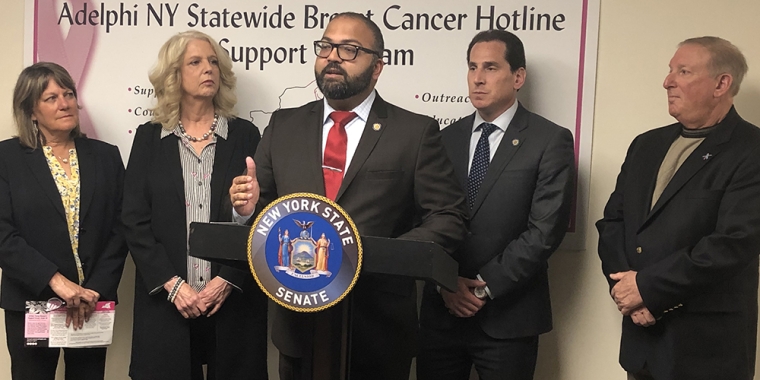Senate Approves Consumer Credit Fairness Act
May 25, 2021
-
COMMITTEE:
- Consumer Protection

(Albany, NY) — Senate Majority Leader Andrea Stewart-Cousins and Consumer Protection Committee Chair Kevin Thomas today announced the passage of The Consumer Credit Fairness Act (CCFA) to protect vulnerable New Yorkers from unscrupulous and predatory debt collection practices.
Hundreds of thousands of debt collection lawsuits are filed against low and moderate income New Yorkers every year. Most of these lawsuits are brought by third-party debt buyers, companies that buy portfolios of old, defaulted debts from original creditors for pennies on the dollar. In many cases, these portfolios include “expired” debts that are too old to be sued on, have already been paid or discharged in bankruptcy, or resulted from identity theft or mistaken identity. Predatory debt buyers exploit gaps in Civil Practice Law and Rules by suing on this expired debt, knowing that the burden will fall on the consumer to prove that the suit is frivolous and unsubstantiated. Even in cases in which debt is legitimately still owed, unscrupulous debt buyers often pad the amounts owed with fees and interest they are not entitled to.
The vast majority of consumers in New York State do not have access to the legal knowledge or information needed to protect themselves from these predatory practices. The devastating toll that abusive debt collection lawsuits take on consumers is a longstanding and persistent problem identified by numerous governmental and public policy institutions, especially amid the financial fallout of the COVID-19 pandemic.
The Consumer Credit Fairness Act (S.153/Thomas) would curb abusive debt collection lawsuits by:
- Requiring a notice to be mailed to the defendants in consumer credit actions by the clerk of the court, ensuring that defendants are given notice of the lawsuit;
- Requiring court filings to include more information about the debt targeted in a lawsuit, such as identifying the debt or account and providing proof that the debt is owed to the plaintiff;
- Lowering the statute of limitations for consumer credit transactions from six years to three years, compelling creditors to file claims in a timely manner and protecting consumers from excessive interest charges and late fees;
- Establishing specific requirements for applications for default judgments in consumer credit actions to prevent debt buyers from suing on expired debt.
Senate Majority Leader Andrea Stewart-Cousins said, “The Consumer Credit Fairness Act will bring us one step closer to ending the cycle of abusive debt collection practices. It is critical that we hold creditors to the appropriate standards and stop unethical practices. This bill will not only reduce the statute of limitations for consumer credit actions, but also protect victims of domestic violence from various forms of financial abuse. I applaud Senator Kevin Thomas for his leadership on this important issue and his efforts to ensure that New Yorkers have the consumer protections they deserve.”
Senator Kevin Thomas said, “Unfair and abusive debt collection lawsuits have become an epidemic across New York State. The consequences of these lawsuits—which often prey on the elderly, disabled, and low and moderate income New Yorkers—are devastating, especially at a time when New Yorkers are already suffering financial difficulties as a result of COVID-19. The Consumer Credit Fairness Act will stop these abusive debt collection lawsuits in their tracks, while preserving the rights of creditors to collect debts in a way that is transparent and fair to consumers.”
"Debt collection lawsuits have a devastating impact on New Yorkers, especially the elderly, the disabled, survivors of domestic violence, and those who live paycheck-to-paycheck. For too long, debt collectors with meritless claims have abused the court system to extract money from financially struggling consumers, almost none of whom can afford an attorney. They’ve left New Yorkers without money for food and housing by garnishing wages or seizing money in bank accounts without warning. These harms have been exacerbated by the COVID-19 crisis, and this law, sponsored by Senator Thomas, will stop them.” said Gina Calabrese, Professor of Clinical Education at St. John’s University School of Law. “The Consumer Credit Fairness Act directly addresses these harms by leveling the playing field for the vast number of vulnerable consumers who are sued and lack legal representation.”
“The Consumer Credit Fairness Act closes gaps in existing law that allow the worst actors to reap huge profits from abusive and illegal debt collection practices, which disproportionately affect consumers of color,” said Carolyn Coffey, Director of Litigation for Economic Justice at Mobilization for Justice, a member of New Yorkers for Responsible Lending, a state-wide coalition of 160 organizations that supports the bill. “We applaud the Senate and specifically Senator Thomas for passing this important legislation, which will especially help New Yorkers financially devastated by the COVID-19 crisis facing future debt collection lawsuits.”
Receivables Management Association International Executive Director Jan Stieger said, “The Receivables Management Association International is appreciative of Senator Thomas’ efforts in working with both industry and consumer stakeholders in the development of this important consumer protection legislation.”
The New York State Creditors Bar Association (NYSCBA) said, “The NYSCBA thanks Senator Thomas for his ongoing efforts to provide fairness to consumers, creditors, creditors’ attorneys, in an effort to preserve the sanctity of the credit ecosystem.”
Encore Capital Group said, “Encore Capital Group appreciates Senator Thomas for his willingness to engage all stakeholders to work through varying interests to achieve a compromise bill.”
Senator Kevin Thomas serves as Chairman of the Consumer Protection Committee and sits on the Banks, Finance, Health, Internet & Technology, Judiciary, and Local Government Committees. He represents New York’s 6th Senate District.
###
related legislation
Share this Article or Press Release
Newsroom
Go to NewsroomDispelling the Model Minority Myth
May 12, 2019

